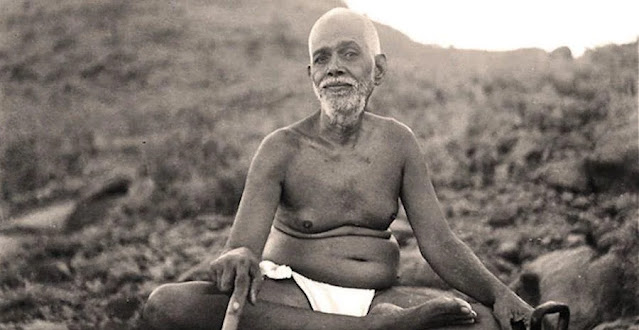(from 'At the Feet of Bhagavan' by T. K. Sundaresa Iyer):
Mr. and Mrs. S. were visitors from Peru to the Ashram. The couple narrated all their story to Bhagavan, all the privations they had undergone to have a look at Sri Maharshi. Bhagavan was all kindness to them; He heard their story with great concern, and then remarked: “You need not have taken all this trouble. You could well have thought of me from where you were, and so could have had all the consolation of a personal visit.’’ This remark of Sri Bhagavan they could not easily understand, nor did it give them any consolation as they sat at His feet like Mary. Sri Maharshi did not want to disturb their pleasure in being in His immediate vicinity, and so He left them at that. Later in the evening Sri Maharshi was enquiring about their day-to-day life, and incidentally their talk turned to Peru. The couple began picturing the landscape of Peru and were describing the seacoast and the beach of their own town. Just then Maharshi remarked: “Is not the beach of your town paved with marble slabs, and are not coconut palms planted in between? Are there not marble benches in rows facing the sea there and did you not often sit on the fifth of those with your wife?’’
This remark of Sri Maharshi created astonishment in the couple. How could Sri Bhagavan, who had never gone out of Tiruvannamalai, know so intimately such minute details about their own place? Sri Maharshi only smiled and remarked: “It does not matter how I can tell. Enough if you know that in the Self there is no Space-Time.’’
======
Vira Chandra: Sri Ramana Maharshi gently shatters the illusion that spiritual benefit depends on physical proximity or pilgrimage to a sacred location. In our modern spiritual culture, seekers often become preoccupied with the external act of traveling to holy places or meeting renowned spiritual personalities. Ramana compassionately corrects this misunderstanding, emphasizing clearly and powerfully that the true pilgrimage is always inward, transcending all limitations of space and time.
His remarkable demonstration—knowing intimate details of a distant place he never physically visited—beautifully illustrates that the Self is beyond all space-time constraints, equally present everywhere, in every moment, within every heart.
Through this teaching, Ramana Maharshi reminds us that no external journey can replace or surpass the inward journey to the Self. Genuine spiritual communion with a Jnani or sacred place occurs within consciousness itself. This message liberates the seeker from anxiety or regret about physical circumstances or the inability to travel externally.
In essence, Ramana lovingly teaches that the greatest temple and ultimate pilgrimage exists in one's own heart, where the timeless Presence of the Self eternally resides.
It has to be said that on other occasions, Ramana Maharshi himself often spoke of the powerful influence of the physical presence of a Jnani (the "physical atmosphere" of silence, grace, and spiritual energy around a realized being) - the Jnani’s physical presence can directly quieten the mind, uplift the heart, and spontaneously facilitate inner transformation, even without words or effort. Yet, the Jnani is not limited by space-time, and thus physical proximity is not ultimately necessary. The highest reality, the Self, which the Jnani embodies, is timeless, boundless, and ever-present. Therefore, sincere inward surrender and devotion, even from afar, can equally invoke the Jnani’s grace, guidance, and blessings.
It can be reconciled that for those able to physically sit in the presence of a Jnani, that opportunity is precious, powerful, and profoundly beneficial. This direct encounter often accelerates spiritual growth because the Jnani’s presence effortlessly stills the mind and ignites devotion. Yet for those who cannot physically visit, there is absolutely no reason for despair. The Self, which the Jnani embodies, is infinite consciousness without limitation. Thus, inner sincerity, faith, surrender, and devotion fully open the heart to that very same transformative power, even if physically distant.
(inspired by above bhajan):
O Beloved,
Come and dwell within the temple of my heart.
This sacred sanctuary I've adorned lovingly
with lamps of devotion, and the fragrance of surrender.
I offer You worship, not in rituals of gold,
but with petals of silence,
with blossoms of longing,
with the fragrance of love alone.
Your seat is my innermost being,
Your form is ever shining there.
Every heartbeat chants Your name;
every breath sings Your praise.
I need no pilgrimage to distant shrines,
for You are already here,
closer than breath, nearer than heartbeat—
in the holy of holies, within.
Accept my simple offering—
this heart, this love, this silent prayer:
You are mine, and I am Yours,
forever united, forever One.











No comments:
Post a Comment